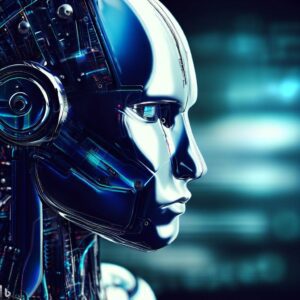Promising Future of Artificial Intelligence
The “Future of Artificial Intelligence” is a captivating realm that holds the promise of transforming our world in unprecedented ways. In the rapidly evolving field of technology today, artificial intelligence (AI) is truly revolutionary. Self-driving cars and intelligent virtual assistants are already conceivable thanks to it. But what exactly does artificial intelligence have in store for the future? We’ll explore the fascinating prospects in the field of artificial intelligence in this piece.
In the fast-paced world of technology, few advancements have captured the imagination as much as artificial intelligence (AI). With each passing day, AI is transitioning from a concept of science fiction to a transformative reality. While we’ve already witnessed remarkable applications such as self-driving cars and intelligent virtual assistants, the journey of AI has merely begun. In this article, we embark on an exploration of the boundless possibilities that await us in the realm of the future of artificial intelligence. From reshaping industries to influencing everyday life, AI’s trajectory promises a tomorrow where the lines between human capabilities and machine intelligence continue to blur.
Understanding AI’s Progress
In the unfolding narrative of the “Future of Artificial Intelligence,” comprehending the remarkable progress achieved by AI is essential. Over time, artificial intelligence has evolved from its nascent stages into a dynamic force that holds immense potential. The trajectory of AI’s development showcases its ability to not just execute predefined tasks, but to learn, adapt, and refine itself—a trait that is defining the future landscape of technology.
Enhanced Automation and Efficiency
One of the most significant contributions of AI to the future is its potential to enhance automation and efficiency. AI-powered automation is poised to revolutionize industries such as manufacturing, logistics, and customer service. Repetitive and time-consuming tasks can be efficiently handled by AI algorithms, freeing up human resources for more creative and strategic endeavors.

Personalized Experiences
The potential for personalized experiences across a range of domains is presented by AI’s ability to evaluate enormous volumes of data rapidly and precisely. Artificial intelligence (AI) may evaluate patient data to offer tailored treatment suggestions in the healthcare industry. Similar to this, AI in marketing may examine user behavior to present relevant and tailored adverts, enhancing user experience and increasing conversion rates.
Education and Learning
The future of AI extends its reach to education as well. Personalized learning platforms powered by AI can adapt to individual student’s learning styles and paces. This can revolutionize traditional educational models, making learning more engaging and effective. AI-driven chatbots can also provide instant tutoring and support to students, making education more accessible.
Challenges and Considerations
Even if artificial intelligence has a bright future, it’s critical to recognize the difficulties and moral dilemmas that come with its development. As AI systems get more self-sufficient, concerns about responsibility and judgment surface. To avoid biased or unfair results, AI systems must be transparent and accountable.
Job Evolution, Not Job Loss
The potential for AI to replace jobs is one major fear. Experts contend that rather than a complete loss of jobs, AI will instead cause employment types to change. Humans will be able to concentrate on jobs that call for creativity, critical thinking, and emotional intelligence as mundane activities become mechanized. In an AI-augmented future, the workforce will need to upskill in order to remain relevant.
AI in Sustainability
Global issues like sustainability and climate change are entwined with artificial intelligence in the future. AI has the potential to be extremely important in forecasting environmental trends, creating sustainable solutions, and optimizing resource utilization. AI-powered simulations, for example, may simulate how different policies will affect the environment and help decision-makers make well-informed choices.
Healthcare Revolution
The potential for AI to completely transform healthcare is especially intriguing. Artificial Intelligence (AI) systems can analyze medical data to give faster and more accurate insights, from illness diagnosis to medication discovery. Early illness identification and more potent therapies may result from this. However, to guarantee patient confidentiality, strong data privacy safeguards need to be in place.
Ethical AI Development
The development of ethical AI is becoming increasingly important as it gets more and more ingrained in our daily lives. It is imperative to guarantee that AI systems are impartial, transparent, and built with human values in mind. Policymakers, ethicists, and engineers must work together to design rules that direct the ethical advancement and application of AI technology.
Conclusion
The future of artificial intelligence is a landscape brimming with potential. From enhancing automation and efficiency to transforming industries like healthcare and education, AI’s influence is set to expand in remarkable ways. As we move forward, we must strike a balance between technological advancement and ethical considerations. By doing so, we can pave the way for a future where artificial intelligence truly enhances human lives while respecting our values and principles.